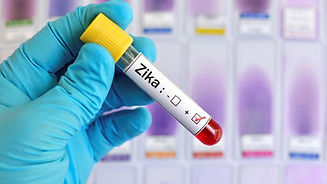Zika
Zika virus infection is caused by the Zika virus and is primarily spread to people through mosquito bites. Zika virus can also be passed by infected individuals to their partner during sex. A woman infected with Zika virus during pregnancy can pass the virus to her developing fetus. Many people who are infected with Zika virus do not have any symptoms. Those that do, usually have mild illness with symptoms that may include fever, rash, joint pain, or redness of the eyes. These symptoms typically resolve on their own within a week.
Infection with Zika virus during pregnancy can cause microcephaly (a condition where the baby’s head is smaller than expected, which is a sign of incomplete brain development) and other severe brain defects in babies. However, detection of Zika virus infection in a pregnant woman does not mean there is definite harm to the developing fetus. Women who are infected with Zika virus while pregnant should be monitored more closely by their healthcare providers throughout their pregnancy.
-
Zika is spread mostly by the bite of an infected Aedes species mosquito (Ae. aegypti and Ae. albopictus).
-
Zika can be passed from a pregnant woman to her fetus. Infection during pregnancy can cause certain birth defects.
-
There is no vaccine or medicine for Zika.
-
Local mosquito-borne Zika virus transmission has been reported in the continental United States

Should pregnant women travel to areas with risk of Zika?
No. Pregnant women should not travel to any area with risk of Zika. Travelers who go to places with risk of Zika can be infected with Zika, and Zika infection during pregnancy can cause microcephaly and other severe brain defects.
If I am traveling to an area with risk of Zika, should I be concerned about Zika?
Travelers who go to places with risk of Zika can be infected with Zika, and CDC has issued travel recommendations for people traveling to areas with a CDC Zika Travel Notice. Many people will have mild or no symptoms. However, Zika can cause microcephaly and other severe birth defects. For this reason, pregnant women should not travel to any area with risk of Zika, and women trying to get pregnant should talk to their doctors before traveling or before their sex partners travel to an area with risk of Zika. It is especially important that women who wish to delay or avoid pregnancy consistently use the most effective method of birth control that they are able to use. Those traveling to areas with risk of Zika should take steps during and after they travel to prevent mosquito bites and sexual transmission of Zika.
What should pregnant women who have recently traveled to an area with risk of Zika do?
